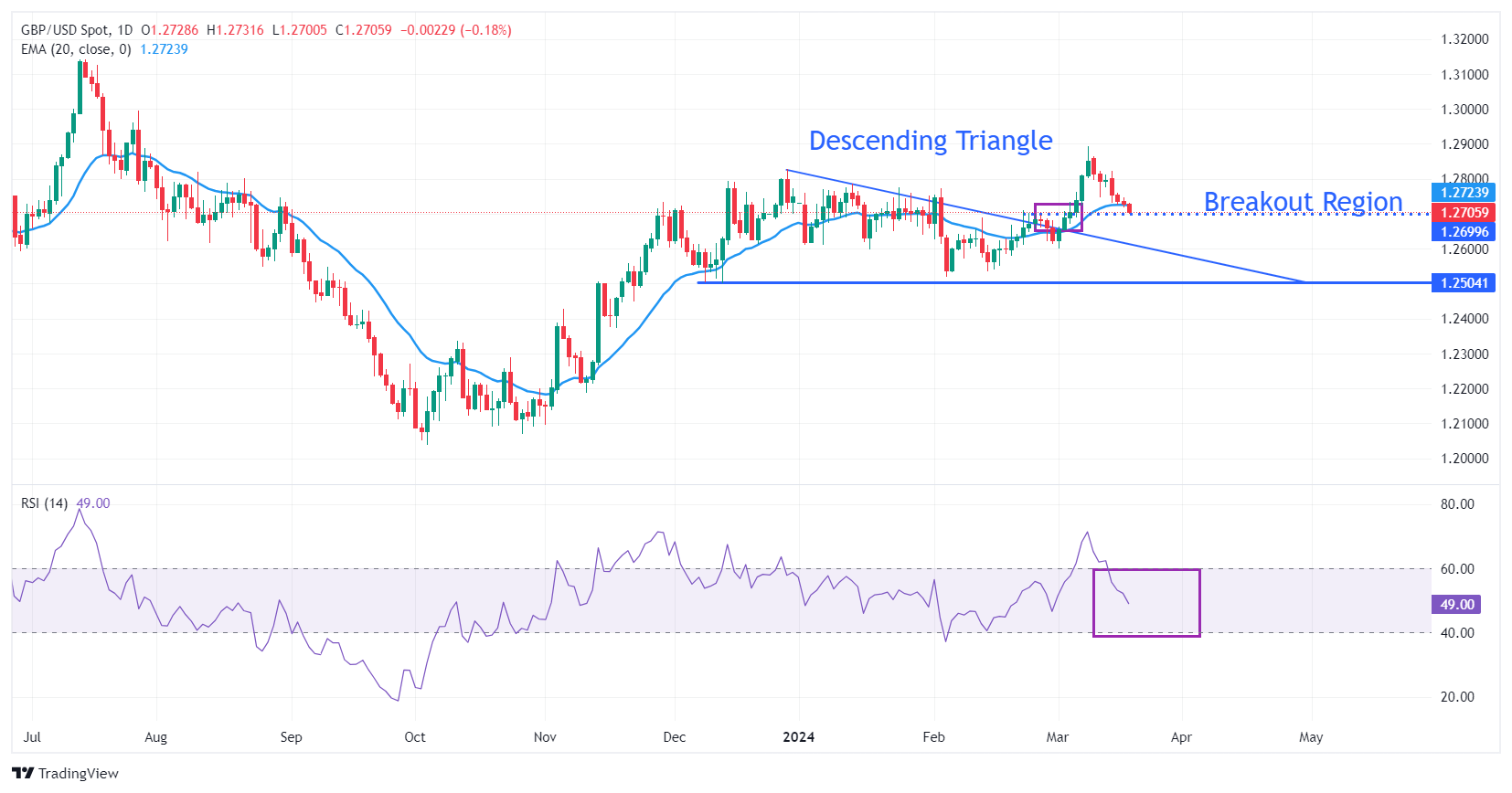- The British Pound updates its weekly low near 1.2670 amid a climate of risk aversion.
- UK inflation data will influence market expectations for a BoE rate cut in August.
- Investors believe that the Fed and BoE will keep interest rates at their current levels.
The British Pound (GBP) continues its losing streak for a fourth trading session on Tuesday, as investors become risk-averse in an important week for central banks. The pair GBP/USD records a new weekly low ahead of interest rate decisions from the Federal Reserve (Fed) and the Bank of England (BoE). With both central banks expected to maintain the status quo, investors will primarily focus on clues on the outlook for interest rates.
In the UK, investors will scrutinize the BoE's policy statement for clues on the timing of interest rate cuts. UK headline inflation has dropped significantly from double digits to 4%, mainly because the BoE has raised and kept interest rates at high levels for over two years. Maintaining higher interest rates has also led to a sharp decline in economic growth, raising expectations of rate cuts in August.
Ahead of the BoE policy decision, market participants will focus on UK Consumer Price Index (CPI) data for February, due to be released on Wednesday. Expectations that the BoE will lower interest rates sooner could rise if inflation data turns out to be softer than expected. On the contrary, if the data is negative, uncertainty about a rate cut will increase. The British pound tends to strengthen when inflation data is higher than expected, suggesting that BoE policymakers will maintain an aggressive stance.
Daily market summary: The pound falls due to the bad mood of the markets
- The British pound falls below the round support at 1.2700, as the discouraging market mood has diminished the attractiveness of risk-sensitive assets. Investor risk appetite has waned ahead of a series of central bank meetings this week: “Investors are unsure whether the Fed will start cutting rates in June, as markets expected, due to to recent inflation data.This has weakened the attractiveness of risk assets.
- Demand for safe-haven assets has improved markedly. The US Dollar Index (DXY), which measures the value of the dollar against six rival currencies, continued its bullish streak for the fourth trading session on Tuesday. The Dollar Index rose to 104.00 on hopes that the Fed will maintain its hawkish talk, having kept interest rates unchanged in the 5.25%-5.50% range on Wednesday.
- This week, the British pound will be guided by the Bank of England's interest rate decision, which will be announced on Thursday. The BoE is expected to keep interest rates at 5.25%. Investors will therefore focus on signals about when the BoE is expected to start reducing interest rates. The market currently expects the BoE to begin cutting interest rates at its August policy meeting.
- Market expectations for a rate cut in August are expected to be influenced by UK CPI data for February, due to be announced on Wednesday. Annual headline inflation is expected to have fallen to 3.6%, down from 4.0% in January. Over the same period, core inflation, which excludes food and energy price volatility, would slow to 4.6% from 5.1% previously. For the monthly headline CPI, economists forecast strong growth of 0.7%, after falling 0.6% in January.
Technical analysis: British pound marks new weekly low at 1.2670

The British pound falls below the breakout zone of the descending triangle formed around 1.2700. Short-term demand for the GBP/USD pair has become uncertain as it has fallen below the 20-day exponential moving average (EMA), which is trading around 1.2730.
On the downside, the descending edge of the descending triangle chart pattern could provide support for the GBP. To the upside, a seven-month high around 1.2900 will be a major roadblock.
The 14-period Relative Strength Index (RSI) returns to the 40.00-60.00 range, indicating a sharp contraction in volatility.
Inflation FAQ
What is Inflation?
Inflation measures the rise in prices of a representative basket of goods and services. General inflation is usually expressed as a month-on-month and year-on-year percentage change. Core inflation excludes more volatile items, such as food and fuel, which can fluctuate due to geopolitical and seasonal factors. Core inflation is the figure economists focus on and is the target level of central banks, which are mandated to keep inflation at a manageable level, typically around 2%.
What is the Consumer Price Index (CPI)?
The Consumer Price Index (CPI) measures the variation in prices of a basket of goods and services over a period of time. It is usually expressed as a percentage of inter-monthly and inter-annual variation. Core CPI is the target of central banks as it excludes food and fuel volatility. When the underlying CPI exceeds 2%, interest rates usually rise, and vice versa when it falls below 2%. Since higher interest rates are positive for a currency, higher inflation usually translates into a stronger currency. The opposite occurs when inflation falls.
What is the impact of inflation on currency exchange?
Although it may seem counterintuitive, high inflation in a country drives up the value of its currency and vice versa in the case of lower inflation. This is because the central bank will typically raise interest rates to combat higher inflation, attracting more global capital inflows from investors looking for a lucrative place to park their money.
How does inflation influence the price of Gold?
Gold was once the go-to asset for investors during times of high inflation because it preserved its value, and while investors often continue to purchase gold for its safe haven properties during times of extreme market turmoil, this is not the case. most of the time. This is because when inflation is high, central banks raise interest rates to combat it.
Higher interest rates are negative for Gold because they increase the opportunity cost of holding Gold versus an interest-bearing asset or placing money in a cash deposit account. On the contrary, lower inflation tends to be positive for Gold, as it reduces interest rates, making the shiny metal a more viable investment alternative.
Source: Fx Street
I am Joshua Winder, a senior-level journalist and editor at World Stock Market. I specialize in covering news related to the stock market and economic trends. With more than 8 years of experience in this field, I have become an expert in financial reporting.







